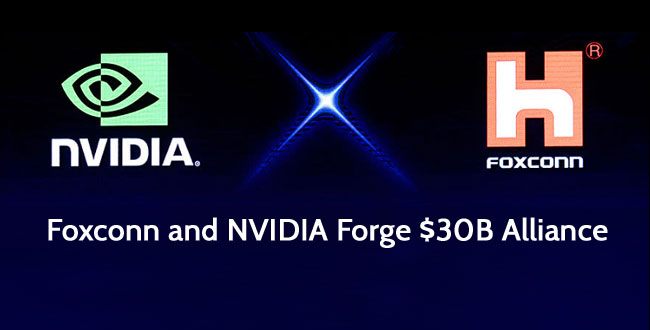The Strategic Pivot: Foxconn and NVIDIA’s $30B AI Factory Redefines Taiwan’s Tech Dominance
In a seismic shift for the global semiconductor industry, Foxconn—the Taiwanese manufacturing titan behind Apple’s iPhone—has announced a $30 billion joint venture with NVIDIA to construct an advanced AI factory in Kaohsiung, Taiwan. Slated for completion by 2027, this facility will mass-produce next-generation AI chips and server systems, positioning Taiwan at the epicenter of the AI hardware arms race. The collaboration merges Foxconn’s precision manufacturing prowess with NVIDIA’s leadership in AI accelerators, signaling a strategic countermove to U.S.-China tech decoupling and supply chain vulnerabilities.
Strategic Implications: Reclaiming Taiwan’s Silicon Sovereignty
Taiwan, already responsible for 60% of the world’s semiconductor output via TSMC, now aims to dominate AI hardware. The Foxconn-NVIDIA facility will focus on three core innovations:
- AI-Optimized GPU Clusters: Production of NVIDIA’s Blackwell Ultra chips, capable of 20 petaflops per rack, designed for hyperscale data centers and autonomous systems.
- Modular Server Architecture: Scalable server units that reduce deployment costs by 40% for tech firms like Meta and Microsoft (per NVIDIA’s Q2 2024 earnings call).
- Automated Precision Manufacturing: Foxconn’s proprietary robotics and AI-driven QC systems will achieve a defect rate of <0.1 parts per million.
“This factory isn’t just about chips—it’s about building the backbone of AI’s future,” said NVIDIA CEO Jensen Huang during the announcement. Foxconn Chairman Young Liu added, “We’re creating an ecosystem where AI hardware innovation meets unparalleled manufacturing efficiency.”
Geopolitical Context: Navigating U.S.-China Tensions
The project arrives amid escalating U.S. restrictions on advanced chip exports to China and Taiwan’s push to fortify its “Silicon Shield” against geopolitical risks. Key considerations include:
- CHIPS Act Compliance: The factory will supply U.S. allies with “CHIPS-compliant” components, bypassing China’s access to cutting-edge AI tech.
- Dual-Use Technology Safeguards: NVIDIA has implemented hardware-level encryption to prevent military repurposing of its chips, addressing concerns raised by the U.S. Department of Commerce.
- Local Job Creation: Taiwan’s government projects 15,000 high-tech jobs by 2030, countering brain drain to Silicon Valley.
However, the venture faces scrutiny. Analysts at TrendForce warn that overreliance on Taiwan’s AI infrastructure could heighten global supply chain risks, citing the 2021 chip shortage crisis.
Technical Breakthroughs: The AI Factory Blueprint
The Kaohsiung facility will integrate groundbreaking technologies:
- 3D-Stacked Chip Design: Leveraging TSMC’s 2nm process nodes for 30% higher energy efficiency.
- Liquid Immersion Cooling: A closed-loop system reducing data center cooling costs by 50% (per NVIDIA’s sustainability report).
- AI-Driven Predictive Maintenance: Machine learning models to forecast equipment failures with 95% accuracy, minimizing downtime.
Early adopters include Amazon Web Services, which has pre-ordered $5 billion in Blackwell Ultra systems for its Project Kuiper satellite network.
Market Impact and Ethical Challenges
- Supply Chain Reshoring: The factory aligns with Apple’s pledge to diversify 30% of its chip sourcing outside China by 2025.
- Environmental Concerns: Greenpeace estimates the facility’s energy demand at 1.2 gigawatts—equivalent to powering 900,000 homes. NVIDIA counters that 60% will come from rooftop solar and offshore wind partnerships.
- AI Ethics: Human rights groups urge transparency in labor practices, given Foxconn’s history of labor disputes.
Gartner predicts the partnership could capture 25% of the $420 billion AI hardware market by 2030, outpacing rivals like Intel and Samsung.
Conclusion: A New Chapter in AI Industrialization
Foxconn and NVIDIA’s alliance transcends traditional tech collaboration—it’s a geopolitical statement and a bet on Taiwan’s irreplaceable role in the AI economy. By merging cutting-edge R&D with manufacturing scale, the Kaohsiung factory could accelerate AI adoption across industries while testing the resilience of global tech diplomacy. As Huang noted, “The next industrial revolution will be built on silicon, and we’re laying its foundation here.”
 Digital Tech Byte Latest Technology News
Digital Tech Byte Latest Technology News





